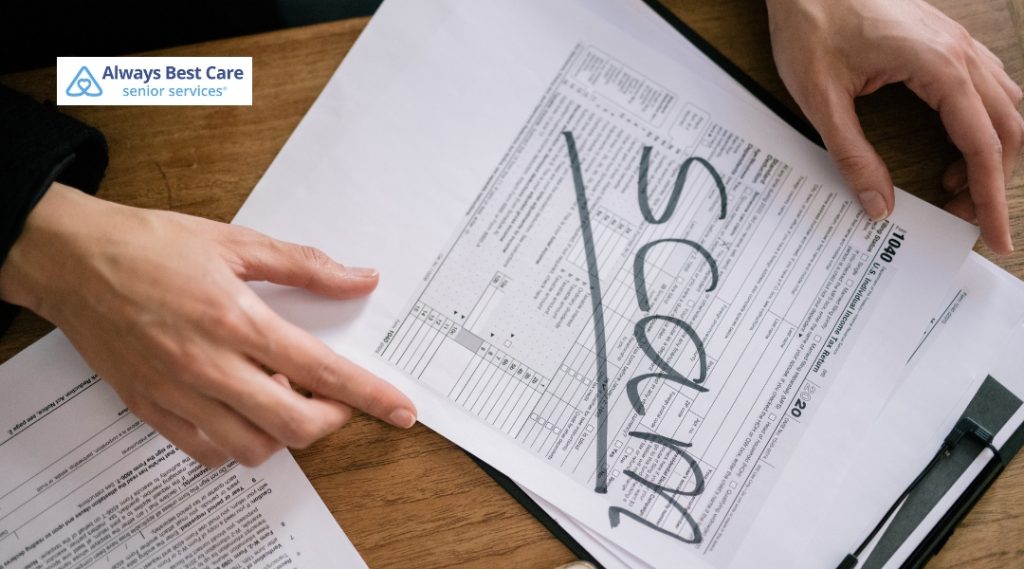Stay Safe: How Seniors Can Spot and Avoid Scams in Dallas, TX

Even in Dallas, a place known for its warmth and hospitality, scams targeting seniors are becoming more frequent.
These deceptive schemes often appear as trusted voices, urgent requests, or irresistible offers. For seniors, knowing how to recognize these tactics is essential, as is having the support of caregivers, family, and friends who can help spot the warning signs.
Table of Contents
6 Common Scams Affecting Seniors in Dallas, TX
Phone Scams: Pretending to Be Loved Ones or Officials
Scammers often disguise their numbers to look local and then call, pretending to be a grandchild in trouble, a police officer, or a government official. These calls may claim that someone you love is in jail, your identity has been stolen, or that you owe money to the IRS or Social Security. The goal is to scare you into acting fast—usually by sending money or sharing private information. If you’re unsure, hang up and call back using a verified number.
Medicare and Health Insurance Fraud Targeting Seniors
Medicare scams are a persistent threat in a city with a growing senior population. Scammers may call offering free medical equipment, claiming to update your benefits, or asking for your Medicare number “just to verify.” Once they have it, they can bill Medicare for fake services or sell your information. Always be cautious of unsolicited calls, and remember: Real Medicare reps won’t ask for personal info over the phone unless you’ve contacted them first.

Tech Support Scams That Trick You Into Paying for Fake Services
You might see a pop-up warning that your computer has a virus or receive a call from someone claiming to be from Microsoft or Apple. These scams are designed to panic you into paying for unnecessary services or giving remote access to your device. If you didn’t reach out for help first, it’s best to ignore the alert and call a trusted tech support provider directly.
Sweepstakes and Lottery Scams Asking for Money Upfront
Getting a call or letter that says you’ve won a big prize might feel exciting, but it’s likely a scam if they ask you to pay “fees” or “taxes” before claiming it. These fake sweepstakes are designed to drain your wallet, not reward it. Dallas-area scammers sometimes use the names of well-known companies or events to sound more credible. Remember: Real contests never ask winners to pay upfront.
Romance Scams That Exploit Emotional Vulnerability
Online dating and social media can be great ways to connect, but they also open the door to romance scams. A scammer may spend weeks or months building a relationship, then suddenly face an “emergency” and ask for money. Seniors in Dallas have been tricked by fake profiles that seem trustworthy, only to be left heartbroken and financially strained. If someone you’ve never met asks for money, it’s a serious red flag.

Charity Scams That Use Disasters or Holidays to Solicit Donations
Dallas is a generous city, especially during tough times or around the holidays. Scammers take advantage of this kindness by posing as fake charities—often after a natural disaster, health crisis, or community tragedy. They may use emotional stories or pressure tactics to get you to donate quickly. Before giving, take a moment to look up the organization through a reliable source.
2 Simple Ways Dallas Seniors Can Stay Scam-Safe
Confirm the Source Before Sharing Info or Money
Whether it’s a phone call, email, or text, don’t share personal or financial information until you’re absolutely sure who you’re dealing with. Scammers often pose as familiar institutions—like your bank, Medicare, or a family member in trouble. Take a moment to verify the message by calling a known number or asking a trusted friend. If something feels rushed or suspicious, it probably is.

Monitor Bank Accounts and Credit Reports Regularly
Set aside time each month to review your bank and credit card statements. Look out for unusual charges, no matter how small. Scammers often start with tiny transactions to test the waters. You can also request free annual credit reports to check for suspicious activity under your name.
Always Best Care’s Caregivers Help Shield Seniors From Scams
In-home care offers more than help around the house—it provides a strong layer of defense against scams that often go unnoticed. As scam tactics become more personalized and sophisticated, having a trusted caregiver in the home can make a huge difference. For seniors in Dallas, where independence is highly valued, in-home support can mean staying safer without giving up control.
Whether it’s a strange phone call, a suspicious email, or someone showing up at the door claiming to be from a utility company, caregivers are often the first to notice something that doesn’t feel right. They can help seniors verify information, report fraud, and avoid impulsive decisions. Trained caregivers know the warning signs of common scams and are ready to step in before any harm is done.
Scammers often prey on loneliness, building trust through emotional manipulation—especially in romance scams or fake emergencies. With regular companionship, seniors are far less likely to fall into that trap.
In-home caregivers provide meaningful interaction, reducing the urge to seek connection from strangers online or over the phone. Simply having someone to talk to and run things by adds strong emotional and digital protection.
At Always Best Care of Dallas, we are dedicated to ensuring the safety and well-being of seniors. Our compassionate caregivers provide daily assistance, companionship, and guidance to help protect against fraud.
Contact Always Best Care of Dallas at (972) 739-8886 to learn more and schedule your free consultation. Stay informed, stay alert, and stay safe.





